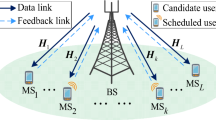Abstract
Joint bandwidth and power allocation for a multi-radio access (MRA) system in a heterogeneous wireless access environment is studied. Since both the number of users being served by the system and the wireless channel state are time-varying, the optimal resource allocation is no longer a static optimum and will change with the varying network state. Moreover, distributed resource allocation algorithms that require iterative updating and signaling interactions cannot converge in negligible time. Thus, it is unrealistic to assume that the active user number and the wireless channel state remain unchanged during the iterations. In this paper, we propose an adaptive joint bandwidth and power allocation algorithm based on a novel iteration stepsize selection method, which can adapt to the varying network state and accelerate the convergence rate. A distributed solution is also designed for the adaptive joint resource allocation implementation. Numerical results show that the proposed algorithm can not only track the varying optimal resource allocation result much more quickly than a traditional algorithm with fixed iteration stepsize, but can also reduce the data transmission time for users and increase the system throughput.
Similar content being viewed by others
References
Doufexi A, Tameh E, Nix A, et al. Hotspot wireless LANs to enhance the performance of 3G and beyond cellular networks. IEEE Commun Mag, 2003, 41: 58–65
Furuskar A. Allocation of multiple services in multi-access wireless systems. In: Proceedings of International Workshop on Mobile and Wireless Communications Network (MWCN), Stockholm, 2002. 261–265
Xu C Q, Fallon E, Qiao Y S, et al. Performance evaluation of multimedia content distribution over multi-homed wireless networks. IEEE Trans Broadcast, 2011, 57: 204–215
Luo C Q, Ji H, Li Y. Utility-based multi-service bandwidth allocation in the 4G heterogeneous wireless access networks. In: Proceedings of the IEEE Wireless Communications and Networking Conference (WCNC), Budapest, 2009. 1–5
Xue P, Gong P, Park J H, et al. Radio resource management with proportional rate constraint in the heterogeneous Networks. IEEE Trans Wirel Commun, 2012, 11: 1066–1075
Koudouridis G P, Aguero R, Alexandri E, et al. Feasibility studies and architecture for multi-radio access in ambient networks. In: Proceedings of the Wireless World Research Forum (WWRF), Shanghai, 2005. 1–12
Pei X B, Jiang T, Qu D M, et al. Radio resource management and access control mechanism based on a novel economic model in heterogeneous wireless networks. IEEE Trans Veh Technol, 2010, 59: 3047–3056
Blau I, Wunder G, Karla I, et al. Decentralized utility maximization in heterogeneous multicell scenarios with interference limited and orthogonal air interfaces. EURASIP J Wirel Commun, 2009, 2: 1–12
Badia L, Taddia C, Mazzini G, et al. Multi-radio resource allocation strategies for heterogeneous wireless networks. In: Proceedings of the International Symposium on Wireless Personal Multimedia Communications (WPMC), Aalborg, 2005. 1–5
Choi Y, Kim H, Han S, et al. Joint resource allocation for parallel multi-radio access in heterogeneous wireless networks. IEEE Trans Wirel Commun, 2010, 9: 3324–3329
Kelly F P, Maulloo A K, Tan D K H. Rate control for communication networks: shadow prices, proportional fairness and stability. J Oper Res Soc, 1998, 49: 237–252
Wang X, Gao N. Stochastic resource allocation over fading multiple access and broadcast channels. IEEE Trans Inform Theory, 2010, 56: 2382–2391
Ismail M, Zhuang W H. A distributed multi-service resource allocation algorithm in heterogeneous wireless access medium. IEEE J Sel Area Commun, 2012, 30: 425–432
Chen J T, Lau V K N, Cheng Y. Distributive network utility maximization over time-varying fading channels. IEEE Trans Signal Process, 2011, 59: 2395–2404
Sadeghi P, Kennedy R A, Rapajic P B, et al. Finite-state Markov modeling of fading channels — a survey of principles and applications. IEEE Signal Process Mag, 2008, 25: 57–80
Costa A, Felisa J V A. Adaptive stepsize selection for tracking in a regime-switching environment. Automatica, 2007, 43: 1896–1908
Tse D, Viswanath P. Fundamentals of Wireless Communication. Cambridge: Cambridge University Press, 2005
Boyd S, Vandenberghe L. Convex Optimization. Cambridge: Cambridge University Press, 2004
Bertsekas D P, Tsitsiklis J N. Parallel and Distributed Computation. New Jersey: Prentice-Hall, 1989
Robert B, Kushner H J. Stochastic approximation: rate of convergence for constrained problems, and applications to Lagrangian algorithms. In: Proceedings of the IEEE Conference on Decision and Control (CDC), Phoenix, 1999. 2361–2366
Kushner H J, Yin G. Stochastic Approximation and Recursive Algorithms and Applications. Berlin: Springer, 2003
Robert B, Kushner H J, Rate of convergence for constrained stochastic approximation algorithms. SIAM J Control Optim, 2002, 40: 1011–1041
Author information
Authors and Affiliations
Corresponding author
Rights and permissions
About this article
Cite this article
Yan, J., Li, J. & Zhao, L. Adaptive joint bandwidth and power allocation in heterogeneous wireless access environment. Sci. China Inf. Sci. 57, 1–14 (2014). https://doi.org/10.1007/s11432-013-4953-z
Received:
Accepted:
Published:
Issue Date:
DOI: https://doi.org/10.1007/s11432-013-4953-z




